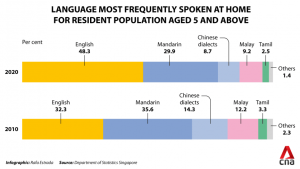
[Getty Images]
Mother Tongue Language is a complex subject. Whether it is Mandarin, Malay or Tamil, many of our students struggle with mastering the language and this situation is getting more awareness and attention.
Along with the increasing dominance of the use of English, it seems like our students’ proficiency in their mother tongue is lessening.
But why is this happening? Besides English becoming our primary business language, it is also because more households use English as their main language for communication.
Let us explore how this affects students.
More English Speaking Households?

[CNA]
In 2020, a government survey showed that there has been an increase in English speaking households. From 32.3 per cent of households speaking English in 2010 to 48.3 in 2020.
It also shows that there are fewer households speaking their mother tongue languages.
From 2010 to 2020, there was a decrease in Mandarin-speaking households from 35.6 per cent to 29.9 per cent. Similarly, the number of Chinese dialect speaking households also decreased, from 14.3 per cent to 8.7 per cent.
This trend continues for Malay and Tamil speaking households too. The number of Malay-speaking households decreased by 24.6 per cent and Tamil-speaking households by 24.2 per cent.
How Does it Affect Students?

[The Independent Singapore News]
The main issue of fewer households speaking their mother tongue is its impact on students. Students don’t get to practice speaking their mother tongue in casual conversations with their family members so their mother tongue speaking skills get rusty.
This affects their sentence structuring, oral skills and listening comprehension skills. Which are skills needed during their Mother Tongue Language exams.
This means that our students have a more difficult time mastering the language. It could also adversely affect their and Singapore’s future.
Global connections
Singapore often trades and has links to large economies like China and India. By learning and improving our mother tongues, it helps ease communications between countries, and boosts job prospects for our students in those markets.
Without the mastery of the language, our current students (the future workforce of Singapore) might have difficulties communicating with these large economies.
Losing bilingual competitive edge
In 2019, Prime Minister Lee Hsien Loong concluded that we are losing our bilingual competitive edge. But what is a bilingual competitive edge? It is when your competitive standing is improved by bilingualism.
For example, if you are bilingual and are competing against a monolingual person for a job, you are more likely to be chosen over that person simply because you are proficient in a second language. But without the mastery of mother tongue languages, our students lose this opportunity which might affect their future employment.
Culture
Another reason we learn mother tongue languages is to connect with our cultural roots. It makes students more comfortable with their cultural identity because in many of their mother tongue textbooks, there are relations to cultural norms or traditions.
For example, there are often texts of old folk tales and superstitions in Chinese textbooks, like the rabbit on the moon. There are also mentions of festivals and practices that students can use to learn more about their mother tongue and Singapore’s culture.
What Can Be Done?

[CNA]
So what can we do to prevent our students’ seemingly worsening mother tongue language skills?
Here are some suggestions:
Practise speaking mother tongue with the older generation
Students can practise speaking in their mother tongue languages with the older generation. Many of the older generation grew up using the language and are more proficient in it. It could be relatives like their grandparents or even the old auntie next door.
Assign one parent to speak in mother tongue
Another way is to assign one parent to converse with their children in their mother tongue. This way, students can get their practice in their mother tongue, and it doesn’t hinder the communication in the family.
Encourage them to join cultural clubs or CCAs
Many schools offer CCAs like Chinese Opera or Malay Cultural Club, so encourage students to join them. They learn more about their mother tongues and get the space and time to practise using them. In these CCAs, students learn more about their culture and heritage too!
Conclusion

[The Straits Times]
Learning mother tongue languages is hard, and students often struggle and dread it, so they must practise using them more in their everyday lives. But with fewer households speaking their mother tongue, this proves to be a challenge.
I hope this article gives you more insight into how the lack of use of mother tongue languages at home affects students and what can be done to improve this situation. Let us know in the comments if you speak your mother tongue at home!
How Much Does a Bilingual Home Environment Help Young Students?
